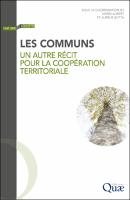Les communs
Un autre récit pour la coopération territoriale
| dc.contributor.editor | Aubert, Sigrid | |
| dc.contributor.editor | Botta, Aurélie | |
| dc.date.accessioned | 2022-07-22T12:06:45Z | |
| dc.date.available | 2022-07-22T12:06:45Z | |
| dc.date.issued | 2022 | |
| dc.identifier | ONIX_20220722_9782759234639_7 | |
| dc.identifier | OCN: 1319215312 | |
| dc.identifier.uri | https://library.oapen.org/handle/20.500.12657/57574 | |
| dc.language | French | |
| dc.subject.classification | thema EDItEUR::J Society and Social Sciences | en_US |
| dc.subject.other | human activity | |
| dc.subject.other | decision support | |
| dc.subject.other | planning | |
| dc.subject.other | land use | |
| dc.subject.other | anthropology | |
| dc.subject.other | biodiversity | |
| dc.subject.other | sustainable development | |
| dc.subject.other | rural development | |
| dc.subject.other | ecology | |
| dc.subject.other | ecosystem | |
| dc.subject.other | environment | |
| dc.subject.other | ethics | |
| dc.subject.other | inhabitant | |
| dc.subject.other | modelling | |
| dc.subject.other | natural park | |
| dc.subject.other | research | |
| dc.subject.other | regulation | |
| dc.subject.other | sociology | |
| dc.title | Les communs | |
| dc.title.alternative | Un autre récit pour la coopération territoriale | |
| dc.type | book | |
| oapen.abstract.otherlanguage | The crises we are going through call into question the models of society on which our priorities and actions are based. How can we regain the capacity to act for an ideal of social and ecological justice? How can How can we remobilise our senses and inhabit our territories with awareness and responsibility? Various avenues are being explored by the international community, States and civil society to make the relationship between social well-being and the state of the environment more explicit. But none of them seems to be able to really take root in the decision-making process. The commons deal with these relationships in a sensitive and reasoned way. This book is the result of 20 years of committed research and transdisciplinary thinking by a group of researchers involved in international cooperation with Southern countries (jurist, economist, modeller, sociologist, geographer, ecologist, agronomist, computer scientist). By simultaneously apprehending the needs of humans and non-humans, the common property approach to land and resources presented in this book invites us to identify and invest in the room for manoeuvre that will allow the diversity of users to assert their prerogatives and assume their duties. The proposed social innovation constitutes the crucible for the inclusion of non-humans in collectives that are instituted, if not sometimes institutionalised. The "actors of living together" thus acquire a capacity for analysis and commitment that they are obliged to make explicit; they mobilise tools and methods that facilitate collective action; and they seek to reach agreement in order to deal with uncertainties. The strengthening of social ties and the resulting ecological awareness are the driving force behind new projects for territories to be co-constructed based on a "shared experience" and a rethought governance. This book is intended for students, political and territorial actors, scientists, development operators, representatives of civil society, in a word, all the actors of the living together mobilized in front of the social and ecological emergency at the scale of the lived spaces. | |
| oapen.identifier.doi | 10.35690/978-2-7592-3464-6 | |
| oapen.relation.isPublishedBy | f3266e68-be04-43a2-896c-b3499f43d67e | |
| oapen.relation.isbn | 9782759234639 | |
| oapen.relation.isbn | 9782759234646 | |
| oapen.relation.isbn | 9782759234653 | |
| oapen.pages | 272 |

